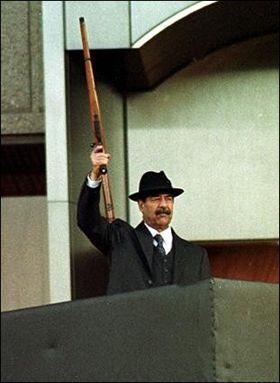 |
 |
| JASSIM MOHAMMED / THE ASSOCIATED PRESS, 2000 |
| Saddam Hussein, shown firing shots to start a parade, saw relations decline with the U.S. during the Iran-Iraq war. |
 |
PARTING SHOTS
U.S. and Iraq once were allies, but accord became conflict.
In the world of diplomacy, the enemy of one's enemy is not necessarily a friend. Deals with dictators are not uncommon. And human-rights violations get overlooked.
After Saddam Hussein became Iraq's president in 1979, foreign-policy experts in Washington regarded him as a sponsor of terrorism and cozy with Soviet Union.
But throughout the 1980s, when Iraq was at war with Iran, the view was reversed. Iraq was removed from the list of terrorist states and seen as a bastion of secularism against Iran's militant Islamic extremism. Saddam became a strategic partner (if not a particularly trusted one) and foreign policy was based on a sort of Middle East domino theory — if Iraq fell, could Kuwait, Saudi Arabia or Jordan be far behind?
The U.S. provided military intelligence to Iraq. It also provided loans for the purchase of U.S. agricultural products. And while Saddam was using this credit to purchase consumer goods, his oil revenues were paying for development of weapons, often with the cooperation of American and European corporations.
NERVE-GAS JITTERS
But during the Iran-Iraq war, the relationship was not without its bumps. Iraq went too far for the State Department by using nerve gas against Kurds in northern Iraq who had formed a battlefield alliance with Iran.
And Iraq thought the U.S. duplicitous when the Iran-Contra scandal came to light in 1986. In that, the U.S. funneled arms to Iran through Israel and gave some of the profits to the Contras in their effort to overthrow the Sandinistas in Nicaragua.
Plus, Saddam reportedly believed the U.S. withheld knowledge of a surprise assault by Iran on Iraq's Fao peninsula.
"The Iraqis believed the United States had to know what was going on and deliberately misled them," Jim Placke, a former senior U.S. diplomat, said recently. "It's not true, but I'm sure to this day they still believe it."
Then came the Persian Gulf War.
Iraq had long coveted Kuwait.
Saddam, told by Ambassador April Glaspie that the U.S. would not take sides in intra-Arab disputes, reportedly took that to mean that he could invade Kuwait.
Glaspie later told Congress that she also told Saddam that the U.S. expected any disputes to be resolved peacefully.
Thinking he had a free pass, Saddam rolled his troops into Kuwait. The U.S. then mustered an international coalition that quickly routed the Iraqis, and the U.N. established crippling Iraqi sanctions.
But even this long-standing, many-sided relationship doesn't touch Iraq's most painful nerve regarding the U.S.
That would be Israel.
Saddam hoped to establish a pan-Arab state, a dream that has been rebuffed by history. He has blamed and despised Israel as the Arabs' most hated enemy.
Israel, on the other hand, has been supported — often unquestioningly — by the U.S. since it declared statehood in 1948. Sandra Mackey, a Middle East expert, recently wrote: To Iraq, the relationship with Israel constitutes a form of Western imperialism and feeds "a seething Arab anger, more against the United States than the West as a whole."



